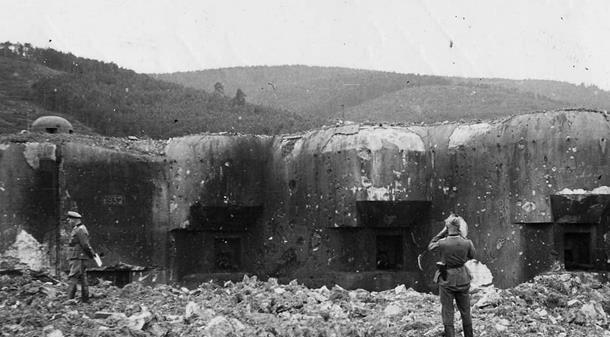The main reason why France spent a lot of money to build the Maginot Line was because France tasted the sweetness of position warfare during World War I.
Before the outbreak of the Franco-Prussian War, France had always been the hegemon of the European continent, and the French at that time had a strong aristocratic ideology, and they advocated the offensive spirit when fighting, and took the death of the battlefield as the highest honor.
However, the proud French in the Franco-Prussian War were unexpectedly defeated by the newly rising Prussia, and after the end of the Franco-Prussian War, Prussia unified Germany, which was nearly twice as large in population as France, and its military strength was very strong, becoming a strong competitor of France in the European region.
After the franco-Prussian War, the French built several forts on the German-French border to defend against german attacks, and these fortresses became the precursors of the Maginot Line.

After the outbreak of the First World War, the French aristocratic class was still very aggressive, and they wanted to defeat Germany on the frontal battlefield and wash away the shame of the Franco-Prussian War. Then during the First World War, the development of various offensive weapons was still in its infancy, and the defensive side had a greater advantage on the battlefield than the offensive side.
After losing a large number of troops, the French army gradually changed its strategy and began defensive operations based on position warfare. As the defensive side was more dominant during World War I, the French army gained a lot of benefits after switching from attack to defense, gradually turning the tide of the war around.
After the end of World War I, France, as one of the victorious powers, severely weakened Germany at the Paris Peace Conference.
Germany was forced to cede a large amount of land and population, and its economic and military strength was greatly damaged, and after the Paris Peace Conference, Germany held a grudge against France and always wanted to find an opportunity to retaliate against France.
By the 1920s, Germany's economic and military power had gradually recovered, and France, fearing German retaliation, stepped up its preparations for war.
Before the Construction of the Maginot Line, the French military leadership actually retained two different opinions:
Main faction: Marshal Foch
Defender: Marshal Pétain
Both of them were high-ranking French military commanders, but they had different opinions on post-war defenses. But in the end, France still adopted the opinion of the defensive, because after the end of the First World War, the war was no less affecting France than Germany, and once it took the initiative to fight again, it would once again put France in a passive situation, and the whole country might collapse because of the war.
In 1929, on the advice of french Minister of War Maginot, France decided on plans to build the Maginot Line.
The reason why France built the Maginot Line was mainly because France did not realize the impact of weapons upgrading on the war, and the old French still believed that the future war would still be dominated by position warfare, and the defensive side would always have a better advantage than the attacking side.
From 1930 to 1940, France spent 10 years building the Maginot Line, costing as much as 5 billion francs, enough for France to build a powerful armored force.
France's original idea was to transfer the direction of the German offensive to Belgium through the Maginot Line, because Belgium was located exactly at the junction of Germany and France, and it was arguably the most perfect strategic buffer zone.
With Belgium as a natural buffer zone, it was possible to delay France's war preparations for several weeks, while drawing Britain into the war through a German attack on Belgium. If Germany had not formed an armored force and France and Germany were still fighting trench warfare, the Maginot Line would certainly have played a crucial role.
However, Germany already had a strong armored battle group, and the form of warfare was no longer positional warfare. By the time German armored forces bypassed the Maginot Line and appeared behind the Maginot Line, the Maginot Line had become a fixture. Of course, the Maginot Line was not useless, and after the outbreak of World War 2, the German army conducted a long period of research and debate in order to break through the Maginot Line, and finally finally determined the Manstein Plan.
Manstein's plan was for Germany to besiege France with three armies:
Army Group A was the main force of the German army attacking the Battle Group of the Ardennes
Army Group B covered the battle group for the German flanks
Army Group C was a German pretend attack maginot line battle group
The confident French had previously intercepted the German "Yellow Plan" plan in Belgium, which was still the conventional thinking of world war I, using large tank groups to attack Belgium, using Belgium as a breakthrough point to raid France.
The leak of this plan caused Hitler great anger, but fortunately Manstein proposed a new battle plan, the main tank group from the Ardenne area raid, this new battle plan created the myth of the War of the German Army to crush France.
The Ardennes region is a large mountainous concentration in France and France, and it is extremely difficult for tank groups to cross easily. It is for this reason that the French troops deployed here are the weakest, but it has almost become an excellent breakthrough point.
If the German army had not made a surprise attack from the Ardennes into France, the Germans would have suffered great losses if they wanted to break through the Maginot Line.
What's more, the Maginot Line was not vulnerable, and when the Germans attacked, it was only Army Group A that broke through the Ardennes and bypassed the Maginot Line, and did not really break the Maginot Line.